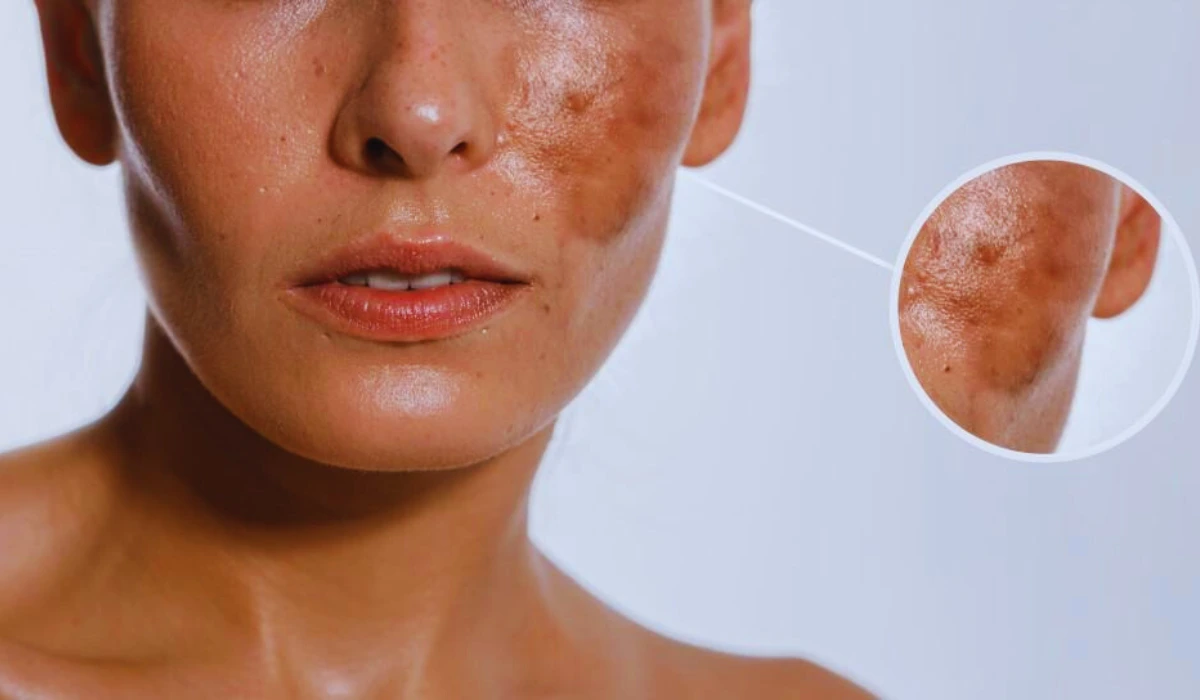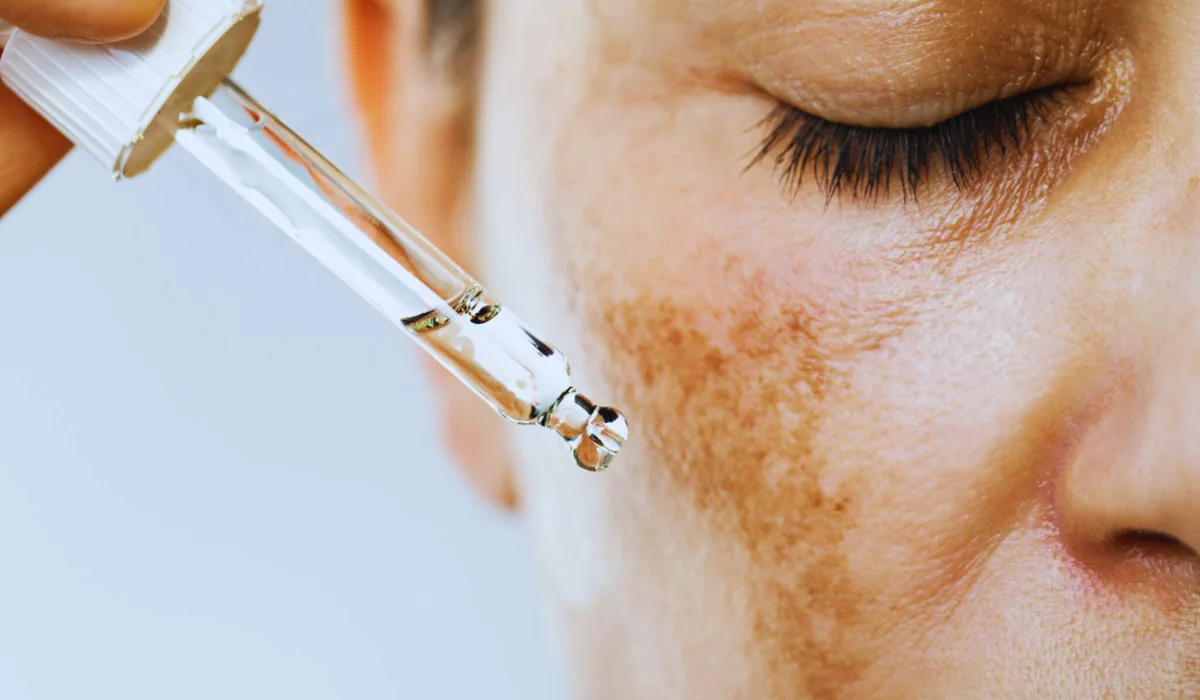Hyperpigmentation is a skin condition that results in the darkening of areas. Melanin production determines skin color. It occurs due to this. When certain spots produce an abundance of melanin, it leads to a skin tone.
Hyperpigmentation can be triggered by factors such as exposure to the sun, changes, aging, and even skin injuries. Hyperpigmentation is usually not a problem. However, it can greatly affect someone’s self-confidence and skin appearance.
There is good news: remedies can effectively alleviate hyperpigmentation symptoms. These remedies also restore a consistent and even complexion.
Understanding Hyperpigmentation
Hyperpigmentation happens when melanocytes become overactive and produce excess pigment. This excess pigment appears in specific areas of the skin.
This manifests as spots, patches, or an uneven skin tone. People’s skin can show various forms of hyperpigmentation.
Melasma is one type, also known as chloasma. Post-inflammatory hyperpigmentation is another type. Age spots are commonly referred to as liver spots. Achieving clear and radiant skin is more challenging due to variations of hyperpigmentation.

The Scientific Reason Behind Hyperpigmentation
Studying hyperpigmentation provides insights into the effectiveness of remedies in addressing this condition. Melanin, responsible for skin color, hair, and eyes, is produced by melanocytes in the skin.
When these cells become too active, they produce melanin excessively. This causes hyperpigmentation. One of the triggers for hyperpigmentation is exposure to sunlight. The sun’s UV rays can stimulate increased production as a mechanism for the skin.
This often results in spots and an overall uneven skin tone. Hormonal changes can contribute to hyperpigmentation. These changes may happen during pregnancy or from taking birth control pills. These hormonal shifts can stimulate melanocytes and contribute to conditions like melasma.
Here Are 8 Remedies That Can Help With Hyperpigmentation
1. Lemon:
Lemon juice contains citric acid, which helps lighten the skin. When used on hyperpigmented areas, it gently removes the top skin layer. This promotes the growth of new skin cells with balanced pigmentation.
Lemon juice’s acidity can gradually reduce and fade spots over time. To use this remedy, mix lemon juice with water. Then, apply it gently to the affected areas using a cotton ball. Leave it on for 10 to 15 minutes before rinsing off.
Lemon juice can increase skin sensitivity to UV damage. Remember to apply sunscreen when using this treatment.
2. Aloe Vera:
Aloe vera is renowned for its soothing effects on the skin. Compounds such as aloin and aloesin are present in it. These compounds have been discovered to inhibit production.
Aloe vera also moisturizes skin, keeping it hydrated and supporting healing. It rejuvenates skin as well. Extract the gel directly from an aloe vera leaf to utilize this remedy. Apply it to the areas affected by hyperpigmentation.
Apply the mixture to your skin. After 15 to 20 minutes, let it sit and then rinse with lukewarm water.
3. Turmeric:
Turmeric is a spice known for reducing hyperpigmentation with its properties. It has anti-inflammatory and antioxidant effects. Curcumin in turmeric inhibits tyrosinase—an enzyme that produces melanin.
Mix one to two teaspoons of powder with water or yogurt to make a paste. Stir until it becomes thick. Apply the paste to the areas. Let it rest for ten to fifteen minutes and then rinse it off.
But be cautious because turmeric can temporarily stain the skin, making it yellowish. Yet, this discoloration will fade over time.
4. Apple Cider Vinegar:
Apple cider vinegar contains acid. The acid exfoliates the skin and lightens spots. It also possesses inflammatory properties that benefit various skin issues.
To utilize apple cider vinegar, dilute it with equal parts water. Apply the solution to the hyperpigmented areas using a cotton ball. Before rinsing off, let it sit for a few minutes.
It’s important to use this remedy in moderation, as excessive use could irritate the skin.
5. Vitamin C:
Vitamin C is an antioxidant. It is also called ascorbic acid. It helps maintain healthy skin. By inhibiting the enzyme tyrosinase, it can reduce hyperpigmentation.
It also interferes with production. Additionally, vitamin C promotes collagen synthesis. This can improve your skin’s texture and complexion. Consider using a serum or cream with vitamin C in your skincare routine.
Apply it to clean and dry skin before applying moisturizer and sunscreen. Consistent use of vitamin C can improve your skin tone over time.
6. Honey:
Honey is a humectant that can attract and retain moisture in your skin. It also contains antioxidants that aid in repairing and rejuvenating your skin. Honey is great for hydrating skin and won’t irritate it.
To utilize honey as a remedy for hyperpigmentation, gently apply a layer of organic honey to the affected areas of your skin. After 10 to 15 minutes, leave it on and rinse with water. You may use this remedy daily or whenever necessary.
7. Licorice root:
Licorice root extract contains a compound called glabridin. Glabridin can inhibit activity. This inhibition reduces melanin production. It helps fade hyperpigmentation.
Licorice root extract has anti-inflammatory properties. It can soothe irritated skin. Consider incorporating licorice root extract into your skincare routine.
You can use products that include it as an ingredient or apply it directly on spots as a spot treatment. For best results, use it as part of your regular skincare regimen.
8. Green Tea:
Green tea extract is another ingredient for addressing hyperpigmentation concerns. The tea has a lot of antioxidants, like EGCG. EGCG protects against UV damage and reduces spots. EGCG has been shown to inhibit production.
After making a cup of tea, allow it to cool to room temperature. Utilize the tea extract by applying it to your skin. You can use a cotton ball or find skincare products with green tea extracts. To enhance the refreshing and soothing feeling, refrigerate the tea beforehand.
Conclusion
Hyperpigmentation is a concern for many. It impacts self-confidence and self-esteem. You can achieve a luminous complexion by integrating remedies into your skincare routine.
Consistently adopt sun protection practices to make strides towards this goal. Keep in mind that achieving results with hyperpigmentation requires consistency and patience.
It’s also advisable to seek advice when necessary, as it can further enhance your progress.
Patience is crucial when treating hyperpigmentation. It could take weeks or even months for results to show. Using sunscreen is important. If the darkening of the skin persists or worsens, it is advised to consult a dermatologist.

